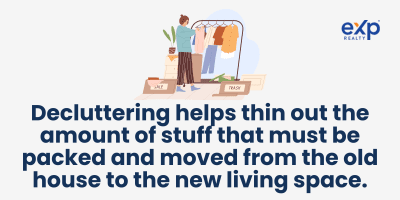So, you’ve decided that it’s time to downsize. Downsizing is usually a hard decision to make, and it usually comes with many questions. It is also a moving moment in your life, but also a necessary process in certain situations. While your current home is full of memories, you need something smaller to fulfill your current needs.
How do you go about downsizing? It can feel stressful and emotional; searching for a new property while also trying to sell your home is a daunting task. Preparing your home and belongings for this new living adventure is also a difficult undertaking.
Even if you are confident this is the right decision for you and your loved ones right now, the decluttering aspect of downsizing can feel daunting because of all the work involved. You may have a lot of stuff to get rid of to live comfortably in your new (and often smaller) home.
Having a real estate agent can help you assess your wishes for your future home and help get you started on the path to downsizing. To get you started, here are 14 simple yet helpful tips to declutter when you’re downsizing.
Why Downsize?
There are many reasons why one might downsize. Often, it’s a decision influenced by entering a different stage of life. For instance, many empty nesters, or parents whose children have moved away, consider finding a smaller space because they don’t need the bigger space anymore.
Older individuals may begin having difficulty moving around as they age; stairs are causes for falls and other injuries, so they may consider downsizing to a one-floor home or getting an apartment or an otherwise smaller living space without these hazards.
There’s also the matter of expense; if you don’t need a big house anymore, why pay for that unutilized extra space? Instead, consider moving into a smaller living space because it costs less too.
Why is Declutter an Important Part of the Downsizing Process?

Decluttering is an integral part of the downsizing process, as it helps thin out the amount of stuff that must be packed and moved from the old house to the new living space. Simple things such as donating disused items, doing a yard sale, garage sale, or filing papers away can make the whole transition smoother and more manageable.
Plus, creating a clutter-free environment in one’s new home makes the living space feel more spacious and breathable. Since relocating to a smaller place means having limited square footage, it is essential to keep everything organized with intention in order to make the most out of any dwelling.
With thoughtful de-cluttering this stage of downsizing can be completed quickly, making it easier to benefit from a lighter lifestyle down the road. Here are some tips to help you in the whole downsizing/decluttering process.
Tip #1 Assess Your Needs
Now that you’ve decided to downsize, the next step is to consider the items to keep and what not to keep. This can be particularly hard depending on how much stuff you have to sort out and organize.
For instance, consider your current location and the location that you’re moving to. If the weather conditions are a lot different, that can affect your packing list. If you live on a lake and won’t be on one at your new place, you can begin by sorting out your life vests and water sports equipment that you know you won’t be taking with you.
You’ll still need your plates and bowls, but maybe you don’t need as many. Say this new place will only have one or two bathrooms instead of three; that means you should sift through your bath towels to have enough for just two bathrooms.
These are some small things to remember when you assess your needs, and it becomes easier the more you think about your new space compared to your current one.
Tip #2 Start Early

When downsizing, it’s best to start as early as you can, preferably before you put in an offer on a home.
You can search around for houses, determining how much living space and storage space you want, but you should start going through your things as soon as you decide it’s time to downsize.
Some things will be easy to get rid of; for instance, if your children have moved out already, make sure any boxes in your attic or storage spaces that belong to them are in their possession.
And like before, if you plan to move soon, you can prioritize donating the things you know you don’t need. One example, like we mentioned before, would be readying your lifejackets and water sports equipment if you won’t be spending another season on the lake.
Tip #3 Create a Plan
Creating a plan will help you stick to downsizing correctly. Downsizing can be frustrating, and there are important details you need to remember. That’s why you shouldn’t go into it without a plan.
You can prevent this by having a plan that is appropriate for you and your abilities. If you start early and map out what things to tackle and when you’ll feel less overwhelmed and ready to get started. You’ll also be less likely to forget those crucial details.
Tip #4 Be Mindful of Sentimental Items
Sentimental items aren’t a foreign concept to anyone. Whether it was a necklace from your first boyfriend, perfumes you inherited from your grandma, or your valued baseball card collection, many of our items have sentiments attached to them, which makes it hard to part from them.
You don’t need to part from sentimental items if you have storage space available. If you know you won’t, you’ll need to go through them and determine what you value most and what will bring you the most joy.
Tip #5 Get Rid of Duplicates

It can happen; someone gives you something you already own, you misplace the receipt, and before you know it, the window has passed to return it. Or maybe the duplicate or miscellaneous items you need in one home aren’t necessary for the new one.
For instance, maybe you have three television sets in three separate rooms in your home, but your new living space only fits one.
Duplicates often create unneeded extra clutter and having these duplicates follow you into your new, smaller home, will be counterintuitive. So getting rid of duplicates is a relatively easy step in downsizing because you don’t need the item and know that you don’t.
You also have the opportunity to make extra money by selling duplicate items, like that extra television set.
Unused items and unnecessary items should also be high in the list of things to get rid of.
Tip #6 Digitize Important Documents
Some of the most cumbersome things to keep track of are documents, because of the physical space they take up. An alternative is to digitize them by scanning and transferring them onto your computer or smart device.
You can also get a flash drive to upload them too; it’s best to have them saved in two separate places, so they aren’t lost forever if something happens to one of them. You can also find it easier to find what you’re looking for in an electronic setting, compared to sifting through boxes and boxes of these documents.
Tip #7 Donate or Sell Unwanted Items
Donating and selling unwanted items are two great options during your downsizing process. You can also offer up any items to family members living in other households; if they don’t want any, feel free to take them to your local thrift store.
You can also sell unwanted items that have some value on the internet, anything can easily go to a new owner, from a vintage piece of furniture, kitchen items or a stuffed animal. Facebook Marketplace is a popular forum to connect with potential customers.You may also be able to wheel and deal for items destined for your new home.
Tip #8 Organize and Declutter One Room at a Time

This tip is perhaps the most important of all! Regardless of the size of your current home, it would be chaotic to be going through every room simultaneously.
So, it’s best to go through your rooms one at a time; where you start is up to you.
Maybe your storage room that’s always perpetually messy; start by organizing and sprucing that up. You’ll feel more confident tackling the other spaces after building yourself up.
Tip #9 Use Storage Solutions
Using storage solutions, like a storage unit or a storage locker, is a great idea, even if you’re not downsizing your home. The organization makes your items more accessible and, in turn, increases the likelihood that you’ll use these items because you know where to find them.
How many times have you found something you forgot you owned? An item that would’ve been useful in a few situations? Implementing storage solutions will ensure you can find things you need.
There’s the added benefit that after organizing, you can clean out that space because you have a better idea of what you use. Test out how often you use items after you organize them to determine if you need them in your home.
Tip #10 Get Help From Family and Friends
Downsizing a home doesn’t have to be a solitary mission. Family and friends and extra hands to help lift, sort, and move your belongings are essential to getting through the downsizing process without going crazy or ripping your hair out.
It’ll be helpful to have extra people in the room to assist you in making decisions about what to keep and what not to keep; they may even offer to take things off your hands right then and there.
Not to mention the heavy or oversized items; there’s no need to risk any injury if you can have family and friends there to help you move items around.
Tip #11 Think Creatively About Storage

Storage solutions are helpful because they let us know what we own and help us to be able to find these items at any time.
To fully utilize your belongings, having a thoughtful and organized storage space will help you get the most out of what you own. This also helps you gauge what you use because you’ll be able to visualize and access everything.
Tip #12 Be Mindful of New Space
Remember that the whole point of this journey is to prepare you to live in a new space. So when you’re going through your belongings, remember that not everything can come with you.
You don’t want to be cramped in your new space because it’ll compromise your simpler life. Just remember that your goal is to live comfortably and go from there.
Tip #13 Be Kind to Yourself
This tip should always be at the forefront during this downsizing process. Downsizing can be a hard and emotional journey; moving from a house that you loved to a small condo is still painful even if the move is very necessary.
Take it slow and remind yourself that you’re doing it for yourself, for a new living space that will benefit you. Also, get excited about how much better things will be when you’re finally settled in your new place.
Tip #14 Keep Only What Brings You Joy
This final tip is another great rule and can apply outside of downsizing.
You should only keep the things that make you happy and bring you joy; this fulfillment will make you feel at peace in your new simpler life.
Key Takeaways
Downsizing can be an emotional and overwhelming journey, but it can be made easy by sticking to these 14 tips. With them, you’ll find a simpler life not dictated by your belongings and in a space that you find comforting.
You can also lean on your real estate agent to help you through it; they are qualified to help you not only find a new home but can also walk you through the downsizing process.
FAQ’s: How to Downsize Your Home
If you still have questions regarding downsizing your home, read the following section:
What’s the four-box method for decluttering?
The four-box method of decluttering is the perfect solution if you’re downsizing but feeling overwhelmed by all the stuff in your life. It’s a simple but highly effective technique that only requires four boxes or containers to get started.
There are different options to tag those boxes. Some people tag one with ‘Keep’, one with ‘Sell’, another with ‘Donate’ and the last one with ‘Throw Away’. Others use the tags ‘Trash,’ ‘Give-Away,’ ‘Keep,’ and ‘Relocate.’ You can use whatever formula works best for you.
Now all you have to do is sort through everything and label it accordingly as you go; this should help make light work of tidying up your space. Just remember to dispose of any items you identified as throwaways or trash correctly, such as recycling instead where possible.
What to get rid of when you downsize?
The simple answer? Anything that doesn’t bring you joy. To be more specific, you should target duplicate items, items that are generally unused, and items that are just unnecessary when you consider your future lifestyle.
These all create clutter and bring stress; you don’t need to keep them around waiting to use them, instead, evaluate how much you use them, and then plan on whether to donate or sell these items.
Why is it so hard to downsize?
The downsizing process requires a lot of work, which makes it feel difficult. You’re forced to go through all your belongings and may not have all the time in the world to do it, especially if you already have a move-in date for your new place.
It can also be an emotional decision to move too. You may be leaving a place with many memories for different reasons than needing a smaller living space.
Maybe you have been struggling to look after yourself or have a harder time moving around; maybe this move represents a loss of freedom in this new life stage. All of this can make it an emotional experience.
Sentimental value can also rear its head; sometimes we have trouble parting with our items because of what they represent. We also try to reason that we may need certain items someday as a justification to keep them.
How do you know when it’s time to downsize?
Knowing when it’s time to downsize is dependent on you and your family. Many couples turn to downsizing after their children move out; they decide they don’t want to continue paying for the extra space and start shopping for a smaller home. Sometimes they keep the house longer so their children and families can stay and visit, but that varies.
Becoming older and beginning to have difficulty moving around is another indicator that it might be time to downsize, especially if it’s harder to go up and down stairs. In that case, you may consider looking at one-floor houses to avoid potential falls.
Other aspects like the house being bothersome to clean, not utilizing all the spaces, and the bills and upkeep becoming increasingly expensive are signs that it might be time to downsize.
Is it worth downsizing to be mortgage free?
Yes, it is worth downsizing to kiss your mortgage fee on your old home goodbye! You’ll have to have your real estate agent evaluate your current home’s equity to predict potential fees.
Usually, you’ll find that losing that mortgage fee in exchange for some smaller fee is worth it. Your real estate agent will be able to help you determine a plan.
Do you pay tax if you downsize?
Yes, you may end up paying taxes if you downsize, especially depending on the location of your new home. Your real estate agent can help you navigate these taxes by helping you determine the value of your current home, its equity, and other factors.
Is there a downside to downsizing?
While clearing out your items and belongings is healthy, there could be a few downsides to downsizing. For instance, you won’t be able to house as many visitors. There could also be an additional cost based on your current home equity.
What is the ideal home size for a retired couple?
The ideal home size for a retired couple may depend on a few things; how much smaller is this new home compared to their previous one?
If they want an extra room for visitors, a one-floor home or any other specifications, these will factor into the size. Budget is also a factor; the ideal home size might not be affordable.
It is an individual answer based on specific needs and wants in a new living space. Regardless, your experienced real estate agent will be able to assess your needs and work with you to find living space appropriate for your budget and wishes.
What are the benefits of downsizing?
The benefits of downsizing are that the property is easier to clean and maintain, and spaces are used to their full potential, which is financially savvy for you.
Having unused space can be frustrating because there’s still upkeep involved; never being able to find items can also be annoying. By downsizing, you can save a little money and live comfortably in a house size perfect for this new stage in your life.
For help with downsizing your home and finding the perfect new property, reach out to an experienced real estate agent. In a competitive housing market, you’ll want that kind of experience in your corner.
That same real estate agent can also help you search for properties in your budget range. In addition, you can sign up for alerts. That will put you on the inside track to know when a new listing comes onto the market.





